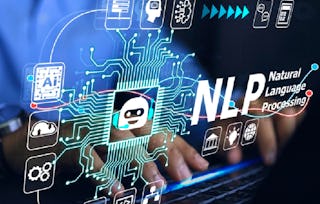Updated in May 2025.
This course now features Coursera Coach! A smarter way to learn with interactive, real-time conversations that help you test your knowledge, challenge assumptions, and deepen your understanding as you progress through the course. Begin your journey into Natural Language Processing (NLP) with an introduction to text data and encoding techniques, delving into the intricacies of regular expressions through extensive practice and use cases. Progress to lexical processing, learning to handle stopwords, split words, and implement bag-of-words and Tf-IDF models, applying these techniques to tasks like spam detection through detailed case studies. Advance to sophisticated lexical processing topics like spelling correction models and the Soundex algorithm, exploring practical implementations via Levenshtein Distance and spell correctors, and tackling challenges such as handling combined words like "New Delhi." This section solidifies your ability to preprocess and clean text data effectively. Transition to syntactic processing, covering parsing and grammar for English sentences, intermediate topics like stochastic parsing, the Viterbi algorithm, and Hidden Markov Models, reinforced through case studies and practical applications. Finally, tackle advanced syntactic processing techniques, including CFG grammar, top-down and bottom-up parsing, and probabilistic approaches like PCFG, concluding with a real-world project on information extraction through a comprehensive case study on ATIS flight reservations. Designed for aspiring NLP practitioners, data scientists, and software engineers, this course enhances understanding of syntactic processing, with a basic knowledge of Python programming and familiarity with machine learning concepts recommended.
















